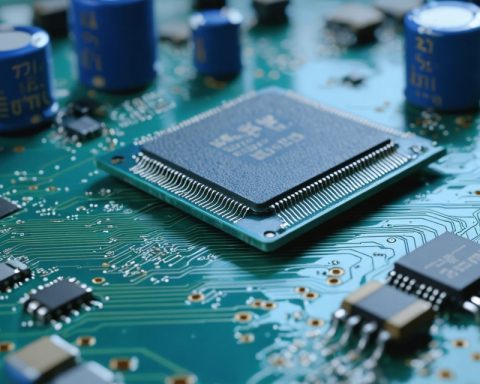- Boeing is facing significant challenges, including safety issues, labor disputes, and frequent leadership changes.
- Delays in delivering the new Air Force One jets, now projected for 2029 or beyond, highlight ongoing supply chain problems.
- Amid financial struggles, Boeing’s stock dropped approximately 3%, resting around $180 per share, below the $200 target.
- New CEO Kelly Ortberg aims to accelerate delivery timelines and restore investor confidence, but challenges remain substantial.
- Boeing’s path forward requires cautious optimism, calling for a profound transformation to regain its former stature.
The skies haven’t been friendly to Boeing lately. The renowned aircraft manufacturer, often celebrated for its engineering prowess, now finds its wings clipped by a series of compounded issues. Safety missteps, tumultuous labor disputes, and frequent shifts in leadership have tangled the company in a web of challenges that stubbornly refuse to dissipate.
This week’s storm intensified when former President Donald Trump publicly lambasted Boeing for dragging its feet on the new Air Force One jets. The promise of delivery, once scheduled for 2024, has been postponed multiple times due to snags in the supply chain and other hurdles, with the latest projection stretching into 2029 or beyond. Such delays have not only frustrated stakeholders but have also painted a vivid picture of Boeing’s current struggles.
Over the years, Boeing’s financial health has taken a nosedive, reflected in a persistent net loss. The mounting challenges shook investor confidence this week as stocks slipped roughly 3%, hovering around $180 per share—far from the optimistic $200 target.
Though new leadership under CEO Kelly Ortberg promises a brighter horizon, turbulence persists. Ortberg’s team has set its sights on accelerating the delivery timelines, but delays remain a stubborn shadow cast over progress. This leadership transition signifies hope but also signals the heavy lifting still required to steer this manufacturing behemoth back to profitability.
Amidst these trials, the essential takeaway for investors and observers alike is that Boeing stands at a crossroads. While history and reputation suggest resilience, the present calls for cautious optimism. Navigating through these clouds will demand more than just engineering finesse—Boeing must orchestrate a transformational turnaround to reclaim its soaring legacy.
Boeing’s Stormy Skies: Navigating Challenges and Opportunities
Safety Missteps and Public Perception
One of the most pressing issues Boeing faces is regaining public trust after infamous safety missteps, notably the two tragic crashes involving the 737 Max. To restore confidence, Boeing has embarked on rigorous safety upgrades, stringent testing protocols, and transparent communication strategies. These initiatives are critical since they influence airline purchase decisions across the globe, thereby affecting future market share and profitability.
Real-World Use Cases
Boeing’s aircraft, especially the 737 series, are widely used in domestic and international flights, composing a significant fraction of airline fleets. Their reliable performance is crucial for airlines’ operational efficiency. However, recent delays have prompted airlines to consider alternatives, emphasizing the need for Boeing to swiftly address its backlog and supply chain challenges.
Market Forecasts & Industry Trends
The global commercial aircraft market, valued at approximately $300 billion in 2023, is projected to grow steadily over the next decade. Much of this growth is driven by increasing air travel demand in Asia-Pacific and the proliferation of low-cost carriers. Boeing’s ability to capture this growth will depend on overcoming current production delays and innovating into fuel-efficient and environmentally friendly aircraft.
Features, Specs & Pricing
Boeing’s flagship products, the 737 Max family and the Dreamliner series, offer state-of-the-art avionics systems, improved aerodynamics, and fuel efficiency. Despite these features, pricing pressures are intense, especially with competitors like Airbus ramping up production of their A320neo. Continuous innovation and competitive pricing will be key for Boeing to retain and expand its customer base.
Security & Sustainability
Boeing is investing heavily in sustainability efforts such as reducing carbon emissions and promoting sustainable aviation fuel (SAF). These efforts are complemented by security enhancements, focusing on advanced cybersecurity measures to protect aircraft systems from modern threats. Adopting greener technologies and robust security protocols will align Boeing with global trends and regulatory expectations.
Insights & Predictions
Despite the challenges, experts predict cautious optimism for Boeing. Successful execution of its strategic plans could stabilize its financial performance by 2025, helping regain lost market share. However, achieving this demands flawless execution in maintaining timelines and budgeting while cultivating customer loyalty.
Pros & Cons Overview
Pros:
– Strong brand reputation and historical performance.
– Diverse product portfolio catering to various airline needs.
– Investments in innovation and sustainability.
Cons:
– Current production and delivery delays tarnishing reputation.
– Stiff competition from Airbus and emerging players.
– Vulnerability to geopolitical and economic instabilities impacting supply chains.
Recommendations and Quick Tips
1. For Investors: Exercise patience while monitoring Boeing’s financial metrics, delivery status updates, and strategic pivots. Assess long-term strategies over short-term stock fluctuations.
2. For Airlines: Engage with Boeing on updates regarding pending orders and consider diversifying portfolios with alternative models to hedge operational risks.
3. For Stakeholders: Support Boeing’s shift towards sustainability and demand transparency in safety and compliance updates.
For further updates on the aviation industry and Boeing’s endeavors, visit the Boeing website directly.
















